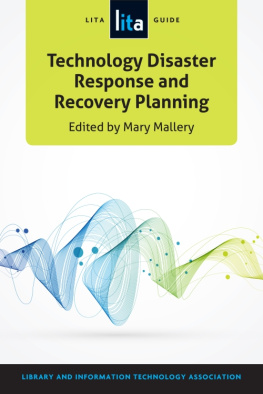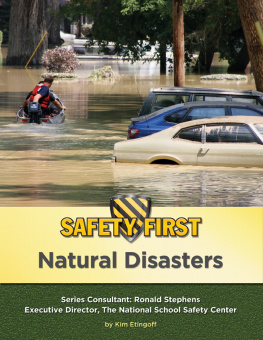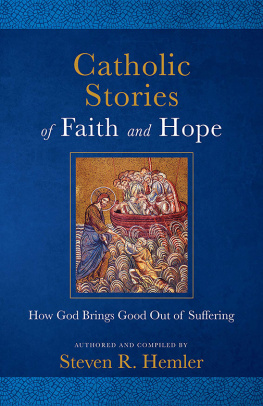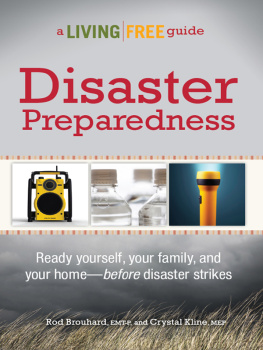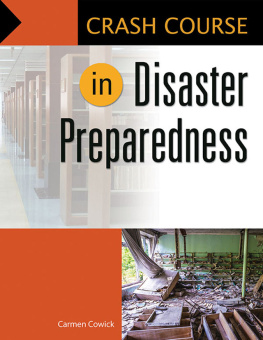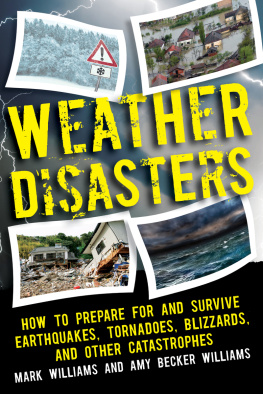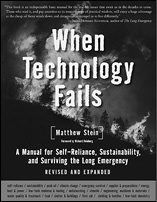
One of the questions I have found myself asking lately is how we can reclaim the ancient idea of the common good. In times of adversity, how can we respond in a way that promotes and preserves our best values? Using the backdrop of disaster preparedness, this book tells how individuals, congregations, and communities have worked together to respond in times of tragedy and crisis. It is a great resource for people of faith to know how best to love and serve their neighbors.
Jim Wallis, Sojourners
I am delighted to hear about the release of Help and Hope: Disaster Preparedness and Response Tools for Congregations. When I read through the list of contributing writers, I knew the text would be rich with best known solutions. The diverse experience of the writers have experienced firsthand the importance of preparing congregations, and I strongly recommend all faith leaders invest in the time to read the wisdom imparted within the text.
Jono Anzalone, The American Red Cross
As people of faith, we are compelled to heal a hurting world. However, it is more apparent than ever that we need strong relationships and the proper tools to accomplish this. Church World Service is a leader in this effort, training faith based partners in disaster preparedness, response, and recovery. Help and Hope is yet another example of this worthwhile and timely effort, providing direction and advice to those congregations who wish to prepare for ministry to those affected by disaster.
Keith Adams, Episcopal Dioceses of New Jersey and Newark
Help and Hope is a much-needed resource that has been long-awaited. Penned by skilled ministers and practitioners, this practical guide is for both ordained and lay ministers alike. Here you glimpse the gritty work of post-trauma ministry through real-life illustrations, useful questions that lead to actionable next steps, and roadmaps for planning meaningful worship, practicing care, and envisioning mission after trauma. If you and your congregation are discerning your roles in the aftermath of disaster, this will be a helpful companion. More books like this one are needed in the coming years as congregations continue to embrace their capacities to be catalysts for healing after trauma.
Kate Wiebe, Institute for Congregational Trauma and Growth (ICTG) and Presbyterian Disaster Assistance (PDA)
DISASTER PREPAREDNESS
AND RESPONSE TOOLS FOR
CONGREGATIONS
AMY GOPP
BRANDON GILVIN
EDS.
Copyright 2014 by Chalice Press.
All rights reserved. For permission to reuse content, please contact Copyright Clearance Center, 222 Rosewood Drive, Danvers, MA 01923, (978) 750-8400, www.copyright.com.
Bible quotations, unless otherwise noted, are from the New Revised Standard Version Bible, copyright 1989, Division of Christian Education of the National Council of the Churches of Christ in the United States of America. Used by permission. All rights reserved.
Scripture quotations marked (NIV) are taken from the HOLY BIBLE, NEW INTERNATIONAL VERSION. NIV. Copyright 1973, 1978, 1984 by International Bible Society. Used by permission of Zondervan Publishing House. All rights reserved.
Scripture marked NASB is taken from the NEW AMERICAN STANDARD BIBLE , Copyright The Lockman Foundation 1960, 1962, 1963, 1968, 1971, 1972, 1973, 1975, 1977, 1995. Used by permission.
Scripture marked CEB is taken from the Common English Bible, copyright 2011 by Common English Bible. Used by permission. All rights reserved.
One Great Hour to Share on page 146 ( 2014 by Leslie Lee and Steve Gretz) is used by permission. All rights rserved.
Cover art: iStock photo.
Cover design: Scribe, Inc.
www.chalicepress.com
Print: 9780827214989 EPUB: 9780827214996 EPDF: 9780827215009
Library of Congress Cataloging in Publication data available upon request
Printed in the United States of America
Contents
Jill Cameron Michel
Jos F. Morales Jr.
Johnny Wray
Chris Herlinger
Tyler Whipkey
Matt Hackworth
Anne Coffman
Josh Baird
Josh Baird and Sandra Kennedy-Owes
Susan Lasalle
Ruama Camp
Jordan Bles
Jay Hartley
Mary Hughes Gaudreau
Lisa Hale
Judy Bezon-Braune
Elaine Zook Barge
Lura Cayton
Barry Shade and Brian Crousure
Christy Smith
Bonnie Osei-Frimpong
Bonnie Osei-Frimpong
Johnny Wray
Amy Gopp
Leslie Lee and Steve Gretz
Seung (Paul) Tche
Brandon Gilvin
Foreword
Help and Hope: Disaster Preparedness and Response Tools for Congregations is an indispensable tool for faith communities to prepare for the critical role they can play when disasters impact their hometowns. This resource provides what the disaster relief and emergency response field has been missing and what North American communities of faith have neededguidance on how to be an asset rather than an obstacle when assisting those who have been affected by disaster.
Twice when I was a teenager, my familys home and business suffered major damage from flooding and high winds caused by hurricanes that traveled up the East Coast of the United States. Those early experiences shaped my understanding of how important community is in such moments. But they also taught me how well-intentioned offerings can become an obstacle in recovering from a major disaster. I learned that some ways of helping are actually more helpful than others.
The most effective recovery occurs when the individuals, families, and communities affected by a disaster play an integral role in determining their own recovery process. Families and communities need to know which resources are available to them and which will be the best tools for recovery. Government assistance for disaster survivors abounds, but accessing it is often a challenging, lengthy, and frustrating experience. Community support, especially through faith-based organizations, is often the most helpful factor in supporting individuals and families who are journeying to recovery.
As my own family learned years ago, and which has been reinforced to me in my professional experience coordinating emergency response and disaster programs, the first step is to expect the unexpected. If and when a disaster occurs, those who are affected by it are best-served when faith communities are well-informed and prepared to function as advocates, spiritual care givers, donors, and support networks.
During my familys brush with disaster, our home had flooded and a group from a local church spent four days helping us mud out and power-wash the lower level of our home. Ill never forget my fathers heartfelt words to the volunteers: I cant tell you how much your help has meant to us. This felt like an impossible job.


